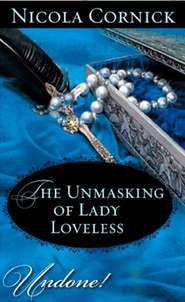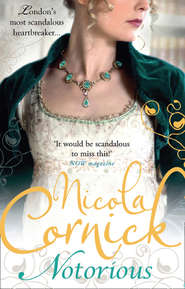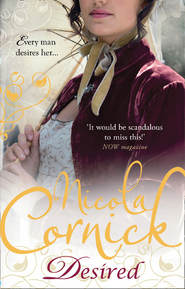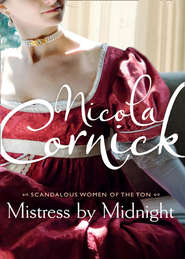По всем вопросам обращайтесь на: info@litportal.ru
(©) 2003-2024.
✖
One Wicked Sin
Настройки чтения
Размер шрифта
Высота строк
Поля
Hagan opened his mouth to speak but it was Mrs. Tong who intervened now, a sweep of her hand silencing him.
“My lord.” Lottie could not quite place the tone in the bawd’s voice. There was deference there, certainly, but something else too. Wariness? Lottie had known all manner of men, from overrefined dandies to brutish bucks, but she had never met a man whose presence felt quite so elemental. There was danger in the room. She felt it in the air and with a prickle down her spine. Suddenly the atmosphere was alive.
“I am sure Mr. Hagan would not mind waiting,” Mrs. Tong said smoothly. “If you would be so good, sir. Can I offer you a glass of wine perhaps? On the house?” She was already shepherding Hagan toward the door. The newcomer stood aside with studied amusement to allow him to pass. Lottie let out her breath on a sigh she had thought was silent until the man cast her a quick, appraising glance.
The door closed.
“You are Charlotte Cummings?” the stranger asked.
“No,” Lottie said. “Not anymore.” The only thing she had wanted from Gregory was money. He could keep his name. It was no use to her. “I am Charlotte Palliser now,” she said.
The man inclined his head. “I had heard that the Pallisers had disowned you.”
“They cannot take my name,” Lottie said. “I was born with it.”
He did not reply at once. He was watching her with that same acute interest that he had shown from the moment he had set eyes on her. His gaze held no sexual appraisal, only a cool calculation that made Lottie shiver for there was no softness in it at all.
“May I?” He gestured to the armchair. She was surprised he troubled to ask permission. Such courtesy sat oddly with the sense that this was a man who would take what he wanted whether anyone opposed him or not.
He sat down and crossed one ankle over the other knee, lounging back with a casual grace. His whole body, so long and lean, looked elegantly relaxed and yet Lottie thought it would be a mistake to dismiss him as yet another fashionable Corinthian. There was too much forcefulness beneath the surface, too much power and intensity banked down.
“Who are you,” Lottie said, “that Mrs. Tong allows you to dictate to her and does not even make you pay in advance?” It appeared that he was not intent on hurrying her into bed, whoever he was.
He laughed. “Ethan Ryder, at your service.” There was a wicked spark in his blue eyes. “And I pay afterward.” He raised an eyebrow. “I do believe you’re blushing. How singular—in a courtesan.”
Lottie turned her face away. He was right. She felt vulnerable, almost shy. This was a man who seemed to be able to strip her feelings bare with no more than a look, and she, no matter what people said, was no brass-faced strumpet.
“Mrs. Tong called you ‘my lord,’” she said. She knew that she sounded doubtful. He looked more like a horse master than an earl, for all his fashionable attire. At one time she had known the entire peerage and she had never met him before. She knew that she would have remembered him.
“How quick of you to notice.” He still sounded amused. “It’s no lie. I am the Baron St. Severin. Oh, and the Chevalier D’Estrange for good measure.”
“You’re French?” Lottie looked up, startled. He did not sound French and it was beyond unlikely. She had no grasp of politics and no interest in gaining one, but even she knew that there was a war on.
“I’m Irish.” He smiled at her, full of charm. “It’s a long story.”
“An Irishman with a French title?” Lottie said. Something clicked in her mind then, a memory of her drawing room in Grosvenor Square and her bosom bows gossiping over the latest on dit, picking at it like crows.
What had they said of Ethan Ryder, the Irish soldier of fortune? She remembered that he was a famed swordsman, a crack shot and the best cavalryman in his regiment. It was rumored that he never lost at games of chance, that he took risks other men would run from, that he was cold and calculating where others were rash and foolish and so he never made a mistake, but waited and waited and wore his enemies down until they took the false step, made the blunder that gave him the game…. And beneath the stories there were the whispers; that he had killed a man in a duel; that he had escaped from the deepest dungeons; that he could pass unnoticed through an opposing army like a ghost….
Napoleon had weighed Ethan Ryder down with titles and money for his devotion to the French cause. He was a soldier of fortune indeed.
She saw the smile deepen on Ethan’s lips and a certain hard light spring in his eyes, as though he knew exactly what she was thinking and what she was about to say.
“Oh,” she said. “Yes. You are the one who is the bastard son of the Duke of Farne and the circus trapeze artist. You betrayed your father and ran away to France as a boy and joined Bonaparte’s Grande Armée. I heard,” she said slowly, “that you had been captured by the British and were a prisoner of war.”
“I am all of those things.” He sounded imperturbable as though mere words, even harsh ones, had long ago lost the power to hurt him. “And you,” he said, “are the divorced former wife of a fabulously wealthy banker, the disgraced Ton favorite, now ruined and forced to sell herself to survive.”
The words fell quietly into the hot little room, but Lottie still flinched. It seemed, she thought, that Ethan Ryder was a deal more comfortable with his situation than she was with hers.
“You express my circumstances most graphically,” she said tightly.
He put his head on one side, his blue eyes narrowed on her face. “You don’t like to be described like that, do you, Lottie Palliser?” His tone was soft but it was not gentle. There was no compassion. Lottie wondered if he could look into her soul and see the tarnish there.
“You don’t want to face the fact that you chose to become a courtesan because you preferred survival to starvation,” he went on, “but it is the truth, just as all the things that you said about me are the truth.” His lips twisted in a parody of a smile. “I think that you and I are very alike, Lottie.” His voice was quiet. “We’re both survivors, both adventurers. We don’t believe in martyrdom.”
“We’re both prisoners,” Lottie said, unable to erase the bitterness from her voice. She made a slight gesture. “Should you not be locked up, my lord?”
He shrugged, supremely elegant and supremely unconcerned. “Plenty of people think so, my father included.”
“And yet,” Lottie said, “you are free.”
This time he shifted in the chair, tension in the line of his shoulders now. “If you call it freedom. I gave my word not to try to escape—my parole—and in return I am penned in a country town in the middle of nowhere, with nothing to do all day, waiting for the war to end.”
“Then what are you doing here in London?” Lottie asked. “Have you broken your parole?”
Ethan shook his head. The candlelight caught the sheen of blue in the deep black of his hair and made his eyes look deep and fathomless. “All officers are permitted to come up to Town once in a while if they plead urgent personal business.” He gestured around the boudoir. “And what could be more urgent and personal than visiting a Covent Garden brothel?” He smiled at her. “I require a mistress,” he said. “That is why I am here. I have come to ask you if you will accept the role.”
CHAPTER TWO
LOTTIE DID NOT ANSWER him immediately. Ethan watched her as she got to her feet and walked away from him. The room was small; there was not far for her to go. He sensed her need to escape. She was like a trapped bird in an exotic cage, like the golden canary that sat mutely in the cage by the window.
“You hate this life, don’t you,” he said. It was a statement of fact, spoken without sentiment or gentleness. It was a long time since he had felt sympathy for anyone.
“Yes.” She did not turn back to look at him. Her shoulders were slumped. The saucy transparent negligee she was wearing with its swansdown trimmings was like a mocking reminder of her status. After a moment he saw her reach for a shawl from the bed and wrap it tightly about herself as though she were cold.
“I should not hate it.” She sounded defiant. “God knows why I feel so demeaned. You are right that I chose this life rather than starve.” She turned and looked at him. “And anyway, I used to like sex.” She sounded vaguely surprised. “I used to be rather good at it, too.”
Ethan laughed. Such plain speaking in a woman was refreshing and unusual. He had heard that Lottie Palliser was an unusual woman but he had not expected her to be quite like this. “That doesn’t mean you would be a good courtesan,” he pointed out. “Nor that you would like the work. When money changes hands it alters matters. It is like being a mercenary soldier. You put yourself up for hire and cannot always be scrupulous about who pays or what you have to do for the money.”
She laughed, a rich throaty sound. “A nice analogy.” The humor fled her voice. “It was naive of me to imagine I could step easily into a role like this.”
There was far more to it than that, Ethan thought. He had heard what had happened to her and knew that the scandal of the divorce and her ruin must have shattered her world and stolen her certainties. No one could remain unchanged by so cataclysmic an experience. Gossip had painted her as a promiscuous harlot, but the woman he saw now was very far from bold. Experienced, certainly, but no shameless whore.
He stood up and walked over to her, taking her chin in his hand and turning her face toward the light. Her skin felt very soft beneath his fingers, but it was difficult to see the real woman beneath the layers of paint.
“Wash your face,” he said abruptly.
Her chin jerked in his hand—evidently she disliked taking orders—but after a moment she freed herself and walked over to the basin, where she poured some water from a big china jug and splashed it on her face. The result, when she came back to his side, was astonishing. Her skin was now bare of cosmetics, a pale creamy color sprinkled with freckles. He let his gaze wander over her. Her face was heart-shaped, tapering to a neat little chin, and her eyes were wide set and dark brown beneath flyaway brows. Her mouth was pale pink and looked sulky by nature; it also looked shockingly erotic, which sent a spike of lust through him. Desire gripped him, strong and sharp, taking him by surprise. All his tastes were jaded, including his lust for women. He had not expected to want her much. He needed her—he needed Lottie Palliser specifically because of her scandalous history—but he had not calculated on desiring her, as well. He continued with his appraisal, blue eyes narrowed now, aware that his blood was beating a little faster and harder and that he wanted to taste that tempting mouth.
There were fine lines about her eyes. They gave character and a certain world-weary cynicism to her face. The color of her eyes, too, was fascinating, as deep and smoky as strong coffee, rich, shadowed, promising endless pleasures.
He put out a lazy hand and unpinned her hair. It uncoiled in thick dark strands over her shoulders, autumn hair with shades of bronze and chestnut and very dark gold. He ran his fingers through the strands and found it to be soft as sateen. She stood absolutely still beneath his gaze, stiller than a hunted mouse. He pulled the shawl from her shoulders and it fell in a puddle about her feet.
She was naked beneath the sheer lacy robe. At such close quarters Ethan could feel her warmth and smell the faint sweet scent of jasmine on her skin. Her breasts pressed against the lace, rounded and voluptuous, the nipples dark through the transparent white. Ethan’s body stirred again. Their eyes met. That lush mouth had a tiny smile lifting the corners now. She knew he wanted her and it pleased her. He felt another kick of lust. He leaned forward, kissed her.
She made no move to twine about him or press her body against his as a more accomplished courtesan might, skillful and eager to please. She stood quite still, her lips warm and soft, slightly parted, beneath his.
He stepped back wanting her all the more.











